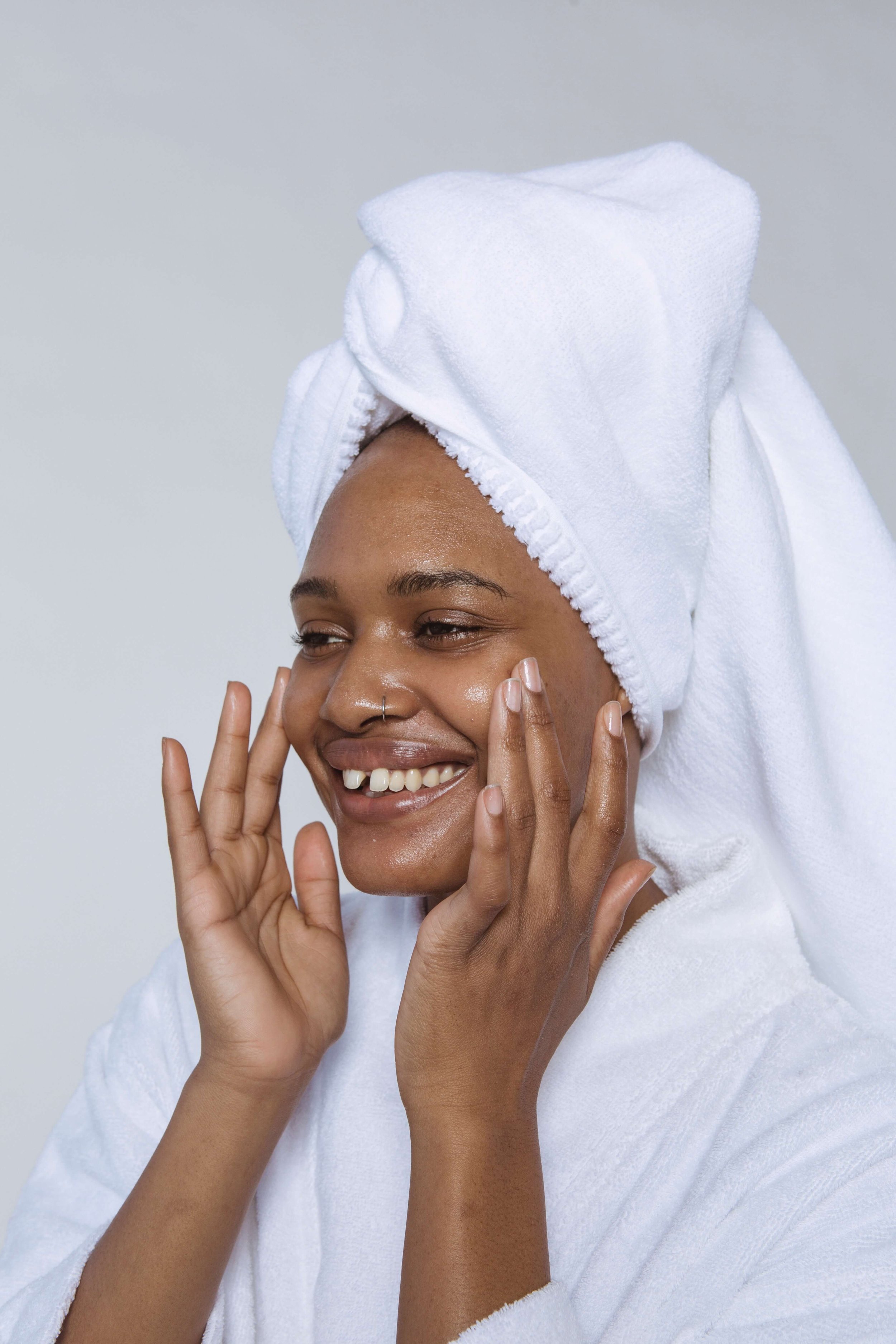Chemical Peels Glossary
There are many treatments on the market and deciding on the best one for your skin can be confusing. Taking that away, we have drawn up a glossary of treatments to help with your research and skincare solutions.
The Black Skin Directory Treatment Glossary is a useful guide that gives you a snap shot of treatments you may come across that have enhanced benefits for darker skin tones.

“Typical” Chemical Peels
Glycolic Acid Chemical Peels
Benefits: Accessible, Safe, Minimal downtime
Used to Treat: Texture, Dullness, Acne, Breakouts, Fine lines and wrinkles, Dark marks
Black Skin Suitable? Yes
Suitable for: Oily, Combination, Balanced, Dry, Dehydrated skin
Not suitable for: Sensitive skin, Rosacea, Dermatitis, Eczema
What you need to know about Glycolic Chemical Peels
Glycolic acid peels remove the upper layer of skin cells, improving texture, congestion and dark marks. Your therapist may recommend preparing your skin for around 4 weeks before your first treatment with a homecare routine involving Glycolic acid. Glycolic Peels range from 10% to 70% and you can work up through the strengths with treatments every 2-6 weeks to be most effective.
Lactic Acid Chemical Peels
Benefits: Gentle, Versatile, Safe
Used to Treat: Texture, dehydration, dark marks, slackness, premature aging
Black Skin Suitable? Yes
Suitable for: Oily, Combination, Balanced, Dry, Dehydrated, Sensitive skin
Not suitable for: Broken, inflamed or the most sensitive skin
What you need to know about Lactic Chemical Peels
Lactic acid peels remove the upper layer of your skin cells, improving texture, dark marks and skin tightness. Lactic acid also hydrates skin meaning it is highly suited to dry and dehydrated skin. As it is more gentle than Glycolic acid, it is a great option to start with before moving on to more advanced options. Lactic acid is also often combined with other active ingredients to create treatments that can tackle a number of concerns.
Mandelic Acid Chemical Peels
Benefits: Gentle, Safe, Multi-functional
Used to Treat: Oiliness, breakouts, dark marks, inflammation, rosacea
Black Skin Suitable? Yes
Suitable for: Oily, Combination, Balanced, Dry, Dehydrated, Sensitive skin
Not suitable for: Anyone with an almond allergy (the plant Mandelic acid is produced from)
What you need to know about Mandelic Chemical Peels
Mandelic acid is a real all-rounder. As well as removing excess skin cells to leave skin smoother and brighter, it can also tackle oil and congestion gently and effectively. Mandelic acid is anti-inflammatory and very gentle meaning it is also suitable for treating rosacea and inflammation. Your therapist may layer Mandelic acid with other peels to act as a buffer if your skin is very sensitive.
Salicylic Acid Chemical Peels
Benefits: Safe, Effective, Targeted
Used to Treat: Oiliness, breakouts, acne
Black Skin Suitable? Yes
Suitable for: Oily, Combination
Not suitable for: Dry, Sensitive skin. Rosacea, Dermatitis, Eczema
What you need to know about Salicylic Chemical Peels
Salicylic acid is the go to active for anyone with persistent oiliness or breakouts. It works by breaking down oil blocking the pores to reduce congestion and treat and prevent spots. It can be drying so your therapist will start on a low strength and build up over a few sessions. Salicylic acid is often combined with other actives within treatments to tackle multiple concerns.

Alternative Chemical Peels
Vitamin A Peels
Benefits: Multi-functional, High powered, Gentle
Used to Treat: Acne, Inflammation, Dark marks, Texture, Dullness, Fine lines, Loss of volume
Black Skin Suitable? Yes (preparation sometimes required)
Suitable for: Oily, Combination, Balanced, Dry, Dehydrated, Sensitive skin
Not suitable for: Very sensitive skin
What you need to know about Vitamin A Chemical Peels
Vitamin A (commonly known as retinol) is the gold standard of ingredients. Vitamin A Peels can be used to treat a wide range of concerns as it is anti-inflammatory. Vitamin A Peels work deeper in the skin than acids such as Glycolic, Lactic, Mandelic and Salicylic but are also very gentle making them suited to treating more serious concerns as well as improving overall skin health. Your therapist will typically apply a Vitamin A peel and then ask you to leave it on for between 3 hours and overnight, depending on your tolerance, before washing it off yourself. Your skin may peel for a few days after the treatment.
Jessner Peels
Benefits: High-powered, Effective, Multi-functional
Used to Treat: Pigmentation, texture, breakouts, dullness, scarring, fine lines and wrinkles
Black Skin Suitable? Yes (preparation required)
Suitable for: Oily, Combination, Balanced skin
Not suitable for: Dry, Sensitive, Dehydrated skin
What you need to know about Jessner Chemical Peels
Jessner peels are made up from a combination of Salicylic and Lactic acid with either resorcinol or ethanol and sometimes Citric acid. They are highly effective for tackling texture and dullness. Jessner peels work by removing the upper-mid layers of the skin and tend to be powerful. Preparation is required on darker skin tones to prevent hyperpigmentation from forming. Your therapist can determine the strength of the peel by adjusting the number of layers they apply to the skin, depending on your concerns and skin type.
TCA Peels
Benefits: Powerful, Versatile
Used to Treat: Pigmentation, texture, breakouts, scarring, fine lines and wrinkles
Black Skin Suitable? Occasionally – thorough preparation and an experienced practitioner are both important
Suitable for: Oily, Combination, Balanced skin
Not suitable for: Dry, Sensitive, Dehydrated skin
What you need to know about TCA Peels
TCA (Trichloroacetic Acid) is a powerful active ingredient used in high level chemical peels. TCA peels penetrate the middle layers of the skin (dermis) and therefore are only a good choice for darker skin tones in exceptional cases, as they can cause hyperpigmentation. In these instances, a practitioner who is highly experienced in working with darker skin and following a strict home preparation regime are vital.
Phenol Peels
Benefits: Powerful, Effective
Used to Treat: Sun damage, scarring, wrinkles
Black Skin Suitable? No
Suitable for: Oily, Combination, Balanced skin
Not suitable for: Dry, Sensitive, Dehydrated skin
What you need to know about Phenol Peels
Phenol (Carbolic acid) is only used in the most powerful chemical peels. These peels work by penetrating to the deepest layer of the skin (reticular dermis) to allow the skin to almost entirely regenerate. Phenol peels can treat serious concerns and are normally recommended for people over 60. They are unsuitable for darker skin tones as they can cause irreversible hyperpigmentation, remove pigment from the skin and create a waxy texture. Phenol peels may need to be applied under sedation, and in the UK are only carried out by medical professionals. Traditional Phenol peels such as the Hetter peel and Baker Gordon peel are being phased out in favour of other less harsh options.

Other Types of Peels
Antioxidant
Benefits: Gentle, Versatile
Used to Treat: Dullness, Light pigmentation, Dehydration
Black Skin Suitable? Yes
Suitable for: Oily, Combination, Balanced, Dry, Dehydrated, Sensitive skin
Not suitable for: Very sensitive skin
What you need to know about Antioxidant Peels
Antioxidant peels are a category of treatments which usually contain Citric acid, sometimes combined with Vitamin C or Mandelic acid. They are usually light peels, offering very gentle exfoliation. Your therapist may combine an antioxidant peel with other peels or treatments to add extra brightness to your skin. As they are very gentle, they are a great first step into chemical peels.
